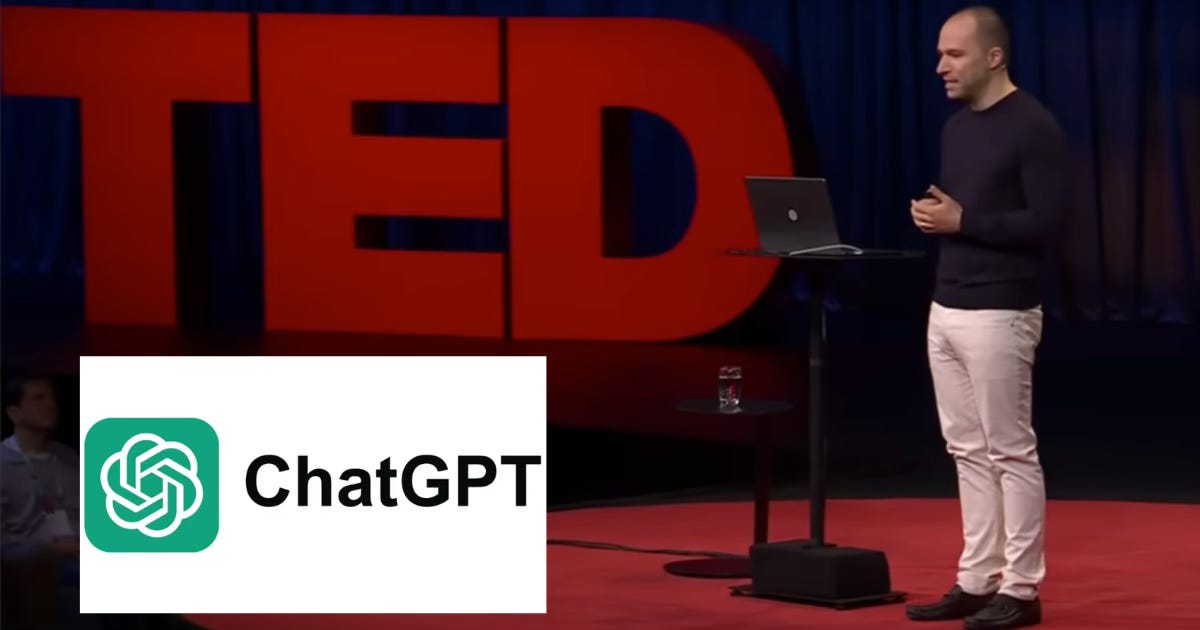What the Man Who Built ChatGPT Actually Wants You to Know (It's Not What You Think)
A plain-English breakdown of his TED talk, with practical tips you can use today
When you hear a title like 'The Inside Story of ChatGPT's Astonishing Potential', you might think: Here we go again, another tech bloke promising flying cars and robot butlers. But Greg Brockman (one of the people who helped build ChatGPT) gave a TED talk that's worth paying attention to.
I've watched it, sifted through the jargon, and here's what you, me, and anyone who's not glued to the tech news should take away.
(The talk was recorded in 2023, and AI has already moved on a lot since then, but the main points are still useful for understanding where things are heading.)
👉 If you want to see the full talk yourself, you can find it here: Greg Brockman: The inside story of ChatGPT's astonishing potential (TED Talk)
1. AI Is Learning Like a Child (but Faster Than Yours Ever Did)
Brockman compared AI's development to teaching a child. You give it feedback, tell it when it's wrong, and reward it when it's right. Except this 'child' learns at lightning speed and doesn't sulk when you tell it off.
That means AI is improving constantly: not just with spelling or sums, but with things that touch our everyday lives. Imagine:
- A doctor being able to explain your medical notes in plain English.
- A bank chatbot that actually answers your question instead of looping you round a phone menu.
- A grandson's homework explained so you can help him (without feeling like you need a PhD in 'new maths').
2. Surprising New Abilities Just Keep Appearing
Here's the odd bit. OpenAI originally trained these systems to do something fairly simple: guess the next word in a sentence. But as they got bigger, strange talents popped out of nowhere. One model suddenly started adding up long sums; another could summarise whole books.
Think of it like buying a kettle that, one day, unexpectedly starts making toast as well. Nobody asked it to, but it works.
Why should you care? Because over the next few years, these 'hidden talents' mean AI will quietly become useful in places you don't expect: health advice, travel planning, even spotting scams before you fall for them.
3. Safety First (Or at Least, Safety in Progress)
Brockman stressed that AI isn't being unleashed all at once. It's tested, tweaked, and shaped by human feedback before it's let loose on the public.
That's good news for us. It means by the time a new version reaches your hands, it's less likely to tell you something dangerous, offensive, or just plain daft. Not perfect (AI still gets things wrong) but better than a free-for-all.
4. Real-World Benefits Are Already Here
Brockman gave examples of AI being put to work in education. One of the best known is Khan Academy, a free online school used by millions of children worldwide. It started out with short YouTube maths lessons and has grown into a huge platform covering everything from grammar to history.
They've now built AI into the system so each child effectively gets a personal tutor. It can explain things differently if they don't understand, give them extra practice, or gently nudge them back on track when they wander off.
That's kids' education, but here's the bigger picture: the same sort of AI support can help us in everyday life. Things like:
- Drafting tricky emails.
- Checking the small print on financial documents.
- Cooking ideas from whatever's left in the fridge.
- Talking through big decisions without interrupting you with 'Have you tried switching it off and on again?'
5. The Big Picture: It's Coming Whether We Like It or Not
Brockman is clear: AI isn't stopping. It will keep growing, and at some point it may rival humans across many areas. That sounds scary, but here's the hopeful part: OpenAI want public input. They don't want this left to techies in California; they want ordinary people (like you and me) to shape how it develops.
That matters. If older voices aren't heard, AI will be designed mainly for young, tech-savvy people. And that would be a shame, because we have plenty to gain: more independence, fewer barriers to understanding, and tools that can help us keep up without feeling left behind.
So, What's the Takeaway?
You don't need to know the nuts and bolts of how ChatGPT works. But you do need to know this:
- It's here to stay.
- It's already useful in everyday ways.
- It could make life simpler if we're willing to try it.
- And yes, it will still make mistakes (just like your satnav insisting you drive through a field).
The sensible approach is to keep an open mind, try small things, and not get dazzled by the hype. AI won't make you a cup of tea anytime soon. But it might help you choose the best teabag.
🟢 Try This Yourself: Three Simple Ways to Use ChatGPT This Week
1. Ask it to explain something in plain English
Type in: 'Explain [insert topic] as if I'm 70 and know nothing about computers.'
2. Turn leftovers into a meal idea
Example: 'I've got three potatoes, a tin of tuna, and some broccoli. What can I cook?'
3. Get a draft of a tricky message
Try: 'Write a polite email to my energy company asking why my bill has gone up.'
(You can then edit it in your own style before sending.)
P.S. After some boardroom drama in late 2023 and a brief sabbatical in 2024, Greg Brockman is very much still at OpenAI. He returned last November and, as recently as June 2025, was on stage at the AI Engineer World’s Fair talking about “technical humility” as a core trait for engineers.


